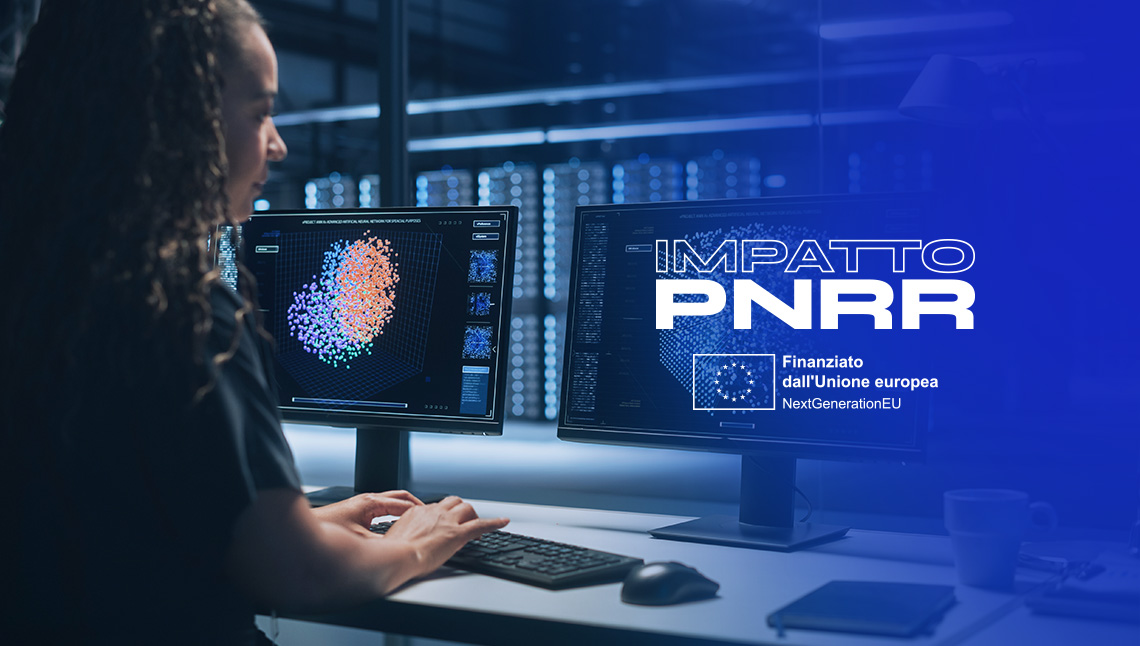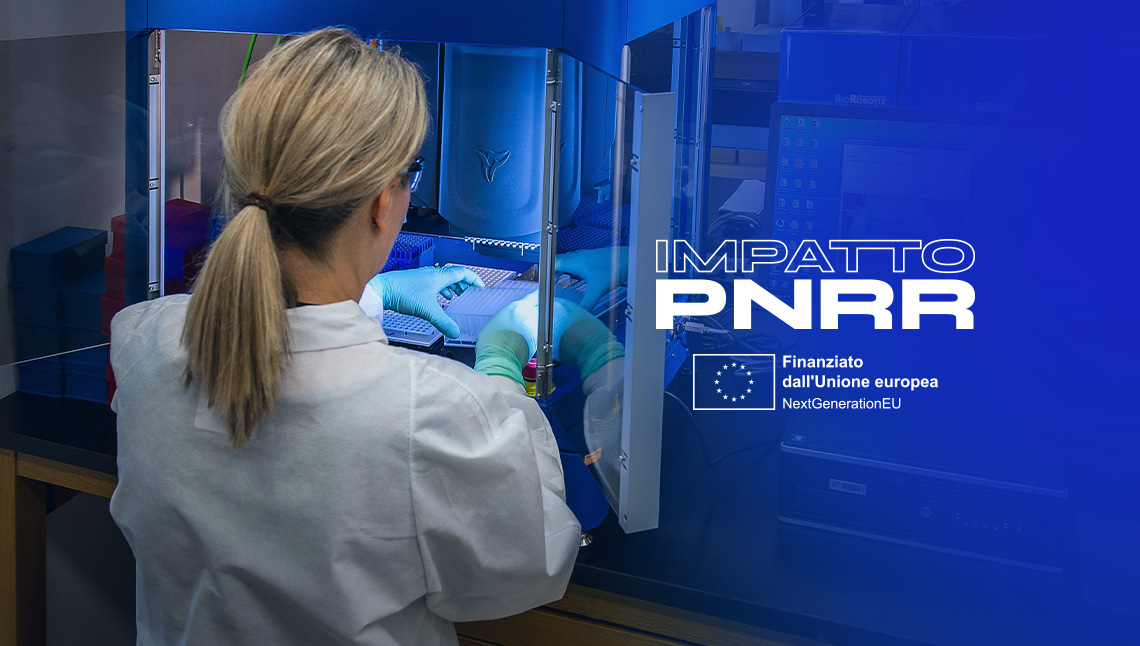
PNRR: The Politecnico takes part in the creation of three research infrastructures
Funding for the implementation of the “Fund for the creation of an integrated system of research and innovation infrastructures” - Investment 3.1 of the PNRR - Mission 4, “Education and Research” - Component 2, “From research to enterprise” published by the Ministry of University and Research on 20 December 2021 has been allocated, and the Politecnico di Torino will be part of no less than three of these infrastructures out of the total thirty planned. Translated into figures, the infrastructures in which the University is involved will receive a total of approximately 115 million euros, of which more than 15.5 million euros will go to the Politecnico di Torino.
The PNRR’s total investment in research infrastructures is 1.08 billion euros, and is aimed at facilitating interaction between the scientific knowledge generated by high-quality research infrastructures and the business sector, in order to boost innovation.
“For the Politecnico and for our territory, receiving this funding and being part of these three new research hubs at the national level represents a very important result that will be a driving force for the economy and for the employment of highly qualified profiles. The University will thus be able to provide itself with new equipment and connect to national and international networks in order to conduct its research in synergy with top-quality companies and research organisations”, comments Rector Guido Saracco.
RESEARCH INFRASTRUCTURES IN WHICH THE POLITECNICO IS INVOLVED
- iENTRANCE@ENL - Infrastructure for ENergy TRAnsition aNd Circular Economy @ EuroNanoLab
New materials, processes and systems for energy generation, storage and distribution are crucial for the future of our planet. The “Infrastructure for Energy Transition and Circular Economy @ EuroNanoLab” (iENTRANCE@ENL) aims to become the reference research infrastructure at Italian level for research on nanomaterials for energy, processes and devices for green production, energy storage and distribution, characterisation of materials at the micro- and nanoscale, and technologies for the realisation of instruments and systems.
It will be structured in 6 internationally recognised geographical nodes in complementary research areas coordinated by a central hub. The Turin node, to which the Politecnico di Torino and INRiM - Istituto Nazionale di Ricerca Metrologica - contribute, will deal with materials, sustainable processes and systems, including their metrologic characterisation, for the energy transition and circular economy.
This is a strategic initiative capable of bringing together the skills of the Politecnico - present in regional infrastructures such as CO2CCL, https://co2circlelab.eu/ and MITE such as SEASTAR, https://www.seastar.centre/ - in the synthesis of functional nanomaterials and in their processing for the production and use of hydrogen for carbon dioxide capture and valorisation, for the harvesting of renewable energy far from the coast (offshore), for electrochemical devices used in energy conversion and storage, and for the underground storage of energy carriers, with INRIM's expertise in metrology, especially for gas networks and smart electricity grids. This new infrastructure significantly enhances, in the direction of energy transition research, the synergy between the Politecnico and INRiM in the joint PiQuET micro and nano fabrication laboratory (https://piquetlab.it/).
More specifically, INRiM will provide metrologic expertise in the study of the magnetic, electrical, optical and thermodynamic properties of matter, which integrate for the realisation of quantum unit standards, as well as for innovative materials and nanostructured devices typical of emerging technologies, such as photonics, spintronics and nanoelectronics.
One of the main objectives is to build prototypes and technology demonstrators, certified from a metrologic point of view, to support the Politecnico’s strategic plan for energy transition, strengthened by a circular economy perspective based on the valorisation of waste and the increased use of renewable energies in materials processing.
Coordinating Body: CNR - Consiglio Nazionale delle Ricerche (National Research Council)
Scientific coordinator at the Politecnico di Torino: Fabrizio Pirri- Department of Applied Science and Technology (DISAT)
Politecnico di Torino Budget: €14,296,940.00
- GeoSciences IR: a research infrastructure for the Italian Geological Services Network
The GeoSciences IR project aims to create the Italian geosciences network, a new research infrastructure for the “Italian Network of Geological Services” RISG, a co-ordination network between ISPRA, the Geological Survey of Italy, and the Regional Geological Services (RGS), i.e. the technical offices within the Regions, Autonomous Provinces and Regional Environmental Agencies.
GeoSciences will provide ISPRA and RGS with expertise and technical-scientific support on specific topics identified by the RGS as priorities. This objective will be mainly achieved through actions of technical-scientific knowledge transfer by Universities and Research Institutes recognised as excellences at the national level.
The Politecnico will develop actions related to the implementation of information systems dedicated to the management of national geological resources.
The aim is to overcome the current fragmentation of data and expertise on geo-resources, especially on raw materials defined as critical by the European Commission. The current need to reactivate mining research is a first step to decrease the excessive dependence on raw material imports from increasingly unstable international markets, in order to build solid domestic supply chains and guarantee a secure and sustainable supply to Italian industry.
The Politecnico will also be engaged in specific capacity-building activities to respond to environmental emergencies and related action plans through the Copernicus Services.
Coordinating institution: ISPRA - Istituto Superiore per la Protezione e la Ricerca Ambientale (Institute for Environmental Protection and Research)
Scientific coordinator at the Politecnico di Torino: Giovanni Andrea Blengini, Department of Environmental, Land and Infrastructure Engineering (DIATI - Dipartimento di Ingegneria dell'Ambiente, del Territorio e delle Infrastrutture)
Politecnico di Torino Budget: €681,590.00
- EBRAINS-Italy - European Brain ReseArch INfrastructureS-Italy
EBRAINS-Italy will be the Italian node of the European distributed infrastructure of EBRAINS, which aims to enable clinical and experimental activities in health to adequately exploit the most advanced modelling, computation and data analysis technologies available in the neurosciences.
The main objective is to bring together within a research infrastructure various groups with cross-sectoral competences in modelling, high performance computing and experimental/theoretical neuroscience operating in Italy, integrating their activities in order to ensure synergies and generate substantial progress in the production and dissemination of knowledge in the scientific, industrial and social fields throughout Italy.
The project results in terms of know-how will be made available through a single access point in order to strengthen the technology transfer and the development of new international research and development collaborations.
The Politecnico will be part of the “Analysis, Modelling, and Simulation facilities and services” group that will play a decisive role in enabling EBRAINS-Italy to develop innovative technologies for the discovery and validation of new drugs and therapies, physical stimulation protocols for brain diseases, applications of digital twins, personalised and precision medicine, bio-inspired robotics, brain-machine interfaces and neuromorphic computing.
In detail, the main aim of the Politecnico di Torino will be the creation of a Neuromorphic Computing Lab focused on the study, development and use of state-of-the-art neuromorphic technologies. The Neuromorphic Computing Lab will make two main contributions to the infrastructure:
- A state-of-the-art neuromorphic platform for the design and development of applications that exploit heterogeneous digital/neuromorphic information systems;
- A framework to support developers in the end-to-end engineering process of Spiking Neural Networks (SNN) simulations performed on neuromorphic devices. This framework will be designed to enable the simulation of SNN models observed in vivo and the development of neuromorphic Machine Learning algorithms to be used as tools to analyse the data produced by the project partners.
With these two components, the Neuromorphic Computing Lab will be able to develop new types of heterogeneous systems that support neuromorphic computing paradigms that can continuously interpret and learn from data and solve complex problems efficiently.
Total budget: €22,370,240.00
Scientific coordinator at the Politecnico di Torino: Enrico Macii - Inter-university Department of Territorial Science, Planning and Policy (DIST - Dipartimento Interateneo di Scienze, Progetto e Politiche del Territorio)
Politecnico di Torino Budget: €587,000.00
